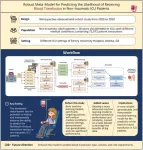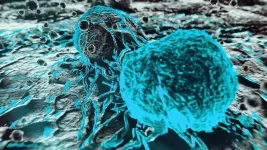AI-powered prediction model enhances blood transfusion decision-making in ICU patients
2025-01-22
(Press-News.org)
Researchers at Emory University have developed a groundbreaking artificial intelligence (AI) model capable of accurately predicting the likelihood of blood transfusion in non-traumatic intensive care unit (ICU) patients. Published in Health Data Science, the study addresses longstanding challenges in predicting transfusion needs across diverse patient groups with varying medical conditions.
Blood transfusions are critical in managing anemia and coagulopathy in ICU settings, yet current clinical decision support systems often focus on specific patient subgroups or isolated transfusion types. This limitation hampers timely and accurate decision-making in high-pressure ICU environments. The newly developed AI model overcomes these barriers by analyzing a wide range of clinical features, including lab results and vital signs, to predict transfusion requirements within a 24-hour window.
The research team, led by Alireza Rafiei from the Department of Computer Science and Rishikesan Kamaleswaran from the Department of Biomedical Informatics at Emory University, utilized a large dataset of over 72,000 ICU patient records spanning five years. By integrating machine learning techniques and a meta-model ensemble approach, the AI system achieved exceptional performance metrics, including an area under the receiver operating characteristic curve (AUROC) of 0.97, an accuracy rate of 0.93, and an F1 score of 0.89.
“Our model not only accurately predicts the need for a blood transfusion but also identifies critical biomarkers, such as hemoglobin and platelet levels, that influence transfusion decisions,” said lead author Alireza Rafiei. “This capability provides clinicians with a reliable decision-support tool, potentially improving patient outcomes and resource allocation in ICU settings”.
The AI model was rigorously evaluated across multiple scenarios to ensure its robustness and reliability in real-world applications. Results demonstrated consistent performance across different ICU cohorts and medical conditions.
Looking ahead, the team plans to integrate this AI model into clinical workflows for real-time decision support, further validating its effectiveness in practical ICU settings. “Our ultimate goal is to personalize and optimize transfusion strategies, enhancing patient care and operational efficiency in hospitals,” said Rishikesan Kamaleswaran.
This study represents a significant step forward in the application of AI to critical care medicine, highlighting the potential of data-driven technologies to transform healthcare delivery.
END
[Attachments] See images for this press release:


ELSE PRESS RELEASES FROM THIS DATE:
2025-01-22
HOUSTON ― The University of Texas MD Anderson Cancer Center’s Research Highlights showcases the latest breakthroughs in cancer care, research and prevention. These advances are made possible through seamless collaboration between MD Anderson’s world-leading clinicians and scientists, bringing discoveries from the lab to the clinic and back.
Novel allogeneic NK cell therapy from induced pluripotent stem cells shows encouraging efficacy in relapsed or refractory B-cell lymphoma patients
Patients ...
2025-01-22
CHICAGO, IL (January 22, 2025) — Scholastica, a leading software solutions provider for academic journals, has released a new integration with Crossmark by Crossref, the industry standard mechanism for reporting updates to published research.
The Crossmark integration is now available to journals subscribed to the Scholastica Open Access Publishing Platform that are published by a Crossref member organization participating in the Crossmark service.
“Clearly communicating article updates and retractions is critical to maintaining the integrity of the scholarly record, and with this ...
2025-01-22
Women are born with two X chromosomes and inherit one from each parent. But in every cell of their body, just one X chromosome is needed – so the other is randomly inactivated. Some cells use only a maternal X chromosome; others rely only on the paternal X.
Now, UC San Francisco researchers have found that when the brain cells of female mice express only a maternal X chromosome, their memory and cognitive skills deteriorate faster than female mice that express both maternal and paternal X chromosomes.
The discovery, which appears Jan. 22 in Nature, could explain the variation in brain aging between the sexes, since males inherit only a maternal X, as ...
2025-01-22
Deeply hidden in Earth’s mantle there are two huge ‘islands’ with the size of a continent. New research from Utrecht University shows that these regions are not only hotter than the surrounding graveyard of cold sunken tectonic plates, but also that they must be ancient: at least half a billion years old, perhaps even older. These observations contradict the idea of a well-mixed and fast flowing Earth’s mantle, a theory that is becoming more and more questioned. “There is less flow in Earth’s ...
2025-01-22
Complete recombination map of the human genome, a major step in genetics
Scientists at deCODE genetics/Amgen have constructed a complete map of how human DNA is mixed as it is passed down during reproduction. The map marks a major step in the understanding of genetic diversity and its impact on health and fertility. It continues 25 years of research at deCODE genetics into how new diversity is generated in the human genome, and its relationship to health and disease.
The new map, appearing today in the online edition of Nature, is the first to incorporate shorter-scale shuffling, ...
2025-01-22
Like humans, mice will compete over territory and mates, and show increased confidence in their fighting skills the more they win. At first, a brain chemical called dopamine is essential for young males to master this behavior. But as they gain experience, the chemical grows less important in promoting aggression, a new study shows.
Dopamine has been linked to male aggression for decades. How past experiences might influence this relationship, however, had until now been unclear.
In experiments in rodents, a team led by researchers at NYU Langone Health boosted activity in dopamine-releasing cells in a part of the brain called the ventral tegmental area. The findings revealed that in ...
2025-01-22
About The Study: Following landmark clinical trials and changes in guideline recommendations, self-reported primary prevention aspirin use decreased among older adults and adults with low atherosclerotic cardiovascular disease (ASCVD) risk for whom aspirin was not recommended, but also decreased among adults with higher ASCVD risk for whom aspirin may still be recommended. Despite these reductions, many patients with limited likelihood to benefit reported continuing to take aspirin.
Corresponding Author: To contact the ...
2025-01-22
About The Study: This study found that female sex was associated with an increased risk of long COVID compared with male sex, and this association was age, pregnancy, and menopausal status dependent. These findings highlight the need to identify biological mechanisms contributing to sex specificity to facilitate risk stratification, targeted drug development, and improved management of long COVID.
Corresponding author: To contact the corresponding author, Dimpy P. Shah, M.D., Ph.D., email ShahDP@uthscsa.edu.
To ...
2025-01-22
About The Study: The results of this study showed that adults ages 18 to 49 reporting medical-only or medical-nonmedical cannabis use vs nonmedical-only use had higher prevalence of cannabis use disorder at all severity levels and reported more frequent cannabis use. These findings suggest that medically recommended cannabis is not associated with reduced addiction risk compared with nonmedical use.
Corresponding author: To contact the corresponding author, Nora D. Volkow, M.D., email nvolkow@nida.nih.gov.
To access the embargoed study: ...
2025-01-22
A study led by David Sancho at the Centro Nacional de Investigaciones Cardiovasculares (CNIC) in Madrid reveals how an increase in intestinal permeability allows the natural gut bacteria to cross the intestinal barrier and reach the bone marrow, where they induce epigenetic changes—modifications that alter gene activity without affecting DNA sequence—in the stem cells that give rise to immune cells. The epigenetic changes induced by the translocated gut bacteria generate “trained” immune cells primed to respond more efficiently to future infections. However, this same ability to amplify the immune response can also aggravate the inflammatory conditions such as ...
LAST 30 PRESS RELEASES:
[Press-News.org] AI-powered prediction model enhances blood transfusion decision-making in ICU patients





